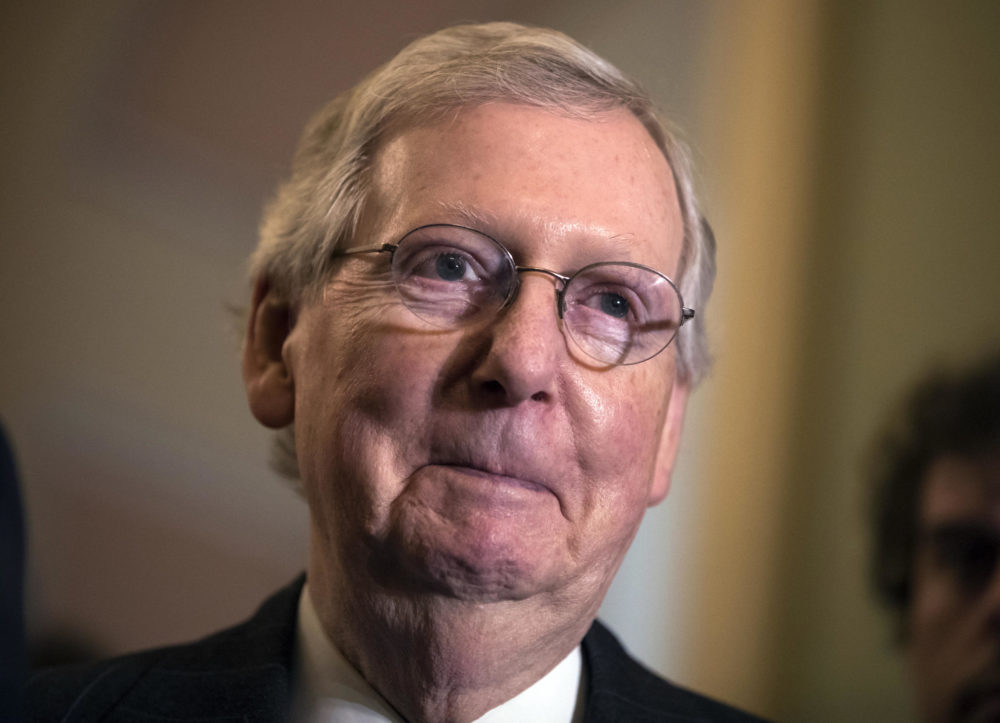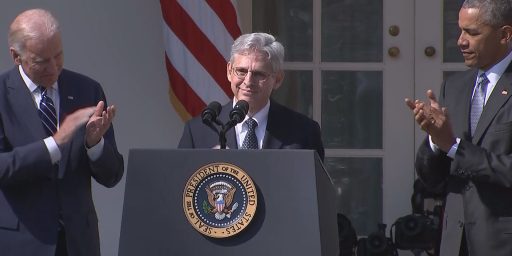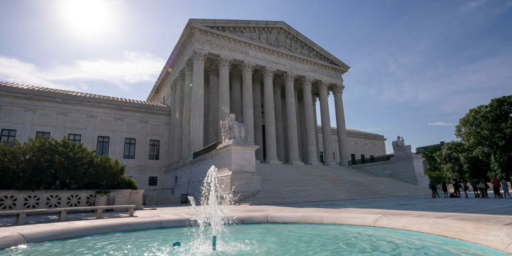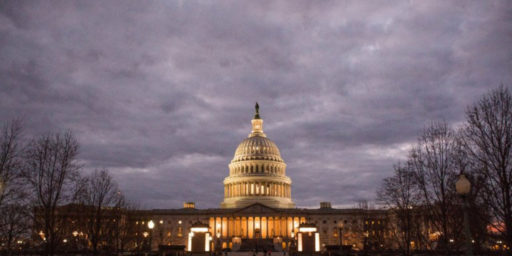McConnell Says Senate Would Fill SCOTUS Vacancy In 2020
Mitch McConnell has had an unsurprising change of heart on the issue of Senate consideration of Supreme Court nominees in a Presidential election year.

In 2016, Mitch McConnell and the Senate Republicans became infamous, or depending on your political point of view, famous, for their refusal to either schedule hearings or take a vote on former President Obama’s nomination of D.C. Circuit Court Judge Merrick Garland to the Supreme Court. At the time, McConnell proclaimed that the fact that the vacancy that Garland would fill, created by the death of Associate Justice Antonin Scalia in February of that year, meant that the seat should remain open until after the election. In support of this position, McConnell made reference to a similar position taken by Joe Biden when he was a Senator and Chairman of the Judiciary Committee back in 1992. Democrats never acted on Biden’s comments, of course, because there was no Supreme Court vacancy in that year.
In any case, despite consistent pressure and criticism from Democrats, Republicans in the Senate stood their ground and, at the end of 2016, Obama’s nomination of Garland lapsed. Shortly after he was inaugurated in 2017, President Trump nominated then-Circuit Court Judge Neil Gorsuch to fill Scalia’s seat and, thanks to the GOP using its majority to eliminate the last remnants of the filibuster for judicial nominations that Senate Democrats had severely weakened in 2013, Gorsuch was confirmed as the 113th Justice of the Supreme Court.
With a Presidential election headed our way next year, McConnell was asked at an event in Kentucky yesterday what the Senate would do with a Supreme Court vacancy that occurred during the course of 2020.
McConnell’s answer?
Senate Majority Leader Mitch McConnell said on Tuesday that Republicans would fill an opening on the Supreme Court if there were a vacancy next year — in contrast with 2016, when he stated his fierce opposition to confirming a justice in the last year of a president’s term.
At a Paducah (Kentucky) Area Chamber of Commerce lunch, McConnell was asked about how he would handle an opening if a justice were to die in 2020, when President Donald Trump is up for reelection. McConnell confidently replied, “Oh, we’d fill it.”
CNN first reported McConnell’s remarks, which were broadcast on WPSD-TV.
The Senate majority leader’s stance contrasts with his handling of President Barack Obama’s nomination of Judge Merrick Garland to replace Justice Antonin Scalia, who died in February 2016. Scalia was an ardent conservative voice on the court, and Garland was a relatively moderate choice who had garnered the praise of Republicans in the past.
But McConnell declared that Obama, a Democrat, would not choose the next justice, saying that voters should have a say through their choice of the next president. He and Republican members of the Senate Judiciary Committee wrote to the White House that they wouldn’t take up Obama’s nomination, and Garland never got a confirmation hearing.
The move infuriated Democrats, who argued McConnell was robbing Obama of his duty to nominate a justice. After taking office in 2017, Trump filled the seat with Neil Gorsuch. In 2020, Republicans will still control both the White House and the Senate.
This is not the first time since the 2016 battle that McConnell has entertained the possibility of filling a seat in an election year. Shortly after the confirmation of Justice Brett Kavanaugh last fall,
McConnell said on “Fox New Sunday” that his resistance to confirming Garland was following the tradition of not filling a vacancy when the Senate and the presidency are controlled by different parties.
More from The Washington Post:
When President Obama nominated Judge Merrick Garland to the Supreme Court in 2016, Senate Majority Leader Mitch McConnell (R-Ky.) refused to consider him, blocking the nominee until after the year’s presidential election.
He said then that “the American people should have a voice in the selection of their next Supreme Court Justice.” The tactic cost Garland his spot on the court.
With his party now in the White House, McConnell said Tuesday he’d try to push through any nomination that President Trump might make to the high court — even if it comes during an election year. Some saw that stance, which McConnell has signaled before, as disingenuous.
McConnell responded to the hypothetical question at a Chamber of Commerce luncheon in Paducah, Ky.
“Should a Supreme Court justice die next year, what will your position be on filling that spot?” an attendee asked, setting up a scenario that would mirror 2016, when Justice Antonin Scalia died suddenly in February.
“Uh, we’d fill it,” McConnell said with a wry, tight-lipped smile.
It’s his most direct comment yet about what would happen if a surprise retirement or death presented McConnell with a 2016 redux, something liberals began to worry over in earnest when Justice Ruth Bader
Ginsburg missed work after being diagnosed with lung cancer. (She had surgery and returned to the court in February.)
At the event, which the local news channel WPSD recorded, McConnell said that confirming judges is the best way to have “a long-lasting positive impact on the country.
“Everything else changes,” he said, before adding that, “What can’t be undone is a lifetime appointment to a young man or woman who believes in the quaint notion that the job of the judge is to follow the law.
That’s the most important thing we’ve done in the country, which cannot be undone.”
After his comments circulated Tuesday evening, McConnell’s critics said it was another example of backhanded partisan gamesmanship.
“History will record McConnell as the true villain of some of the ugliest moments in this period of US history,” Susan Hennessey, the executive editor of the Lawfare blog, said in a tweet.
Some also criticized the humor McConnell used to punctuate his response.
“Senator McConnell’s statements further damage and undermine the Supreme Court at a time when its standing has been significantly diminished in the eyes of the public,” said Kristen Clarke, the executive director of the Lawyers’ Committee for Civil Rights Under Law, in a statement. “This is no laughing matter.”
Matthew Yglesias, co-founder of Vox.com, argued that McConnell’s tactics were opportunistic but hardly unique.
“At times, political leaders stake out positions on process issues that seem hypocritical or opportunistic,” he wrote on Twitter. “Mitch McConnell stands out from the pack somewhat in how open and unembarrassed he is about this, though the basic pattern is far from unique.”
But David Popp, McConnell’s spokesman, said the majority leader’s remarks were nothing new.
“What the leader did today is emphasize what he has said since October,” Popp told The Washington Post, referring to comments McConnell made last year in which he left open the possibility that he would help advance a Trump nominee in 2020.
In October, McConnell said at a news conference that his decision to block Garland’s appointment was based on a tradition that opposition parties in control of the Senate do not confirm Supreme Court nominees during presidential election years. He claimed the precedent only applies when different parties control the Senate and the White House — which was the case in 2016, but would not be in 2020.
“The tradition going back to the 1880s has been if a vacancy occurs in a presidential election year, and there is a different party in control of the Senate than the presidency, it is not filled,” McConnell told reporters then.
“Look, it’s practical,” he added. “Think about it. There’s no chance that an opposition party in control of the Senate is going to fill a Supreme Court vacancy occurring in the middle of a presidential election year, and that’s why it hasn’t happened since the 1880s.”
Senate Minority Leader Chuck Schumer summed up what is likely to be the standard response on the left:
I suppose my first response to Schumer’s point is that of course, McConnell is a hypocrite. Hypocrisy has become baked into our political system at all levels and it is, quite frankly, a by-product of the hyperpartisanship that has come to characterize politics in this country. While it’s true that we haven’t seen Democrats do something like this, we have seen them block otherwise qualified judicial nominees as they did during the George W, Bush Administration with several nominees to the Circuit Courts of Appeal including, most notably, former Attorney General Alberto Gonzalez who many at the time saw as someone who was being groomed as a potential future Republican nominee to the Supreme Court itself. In any case, as I said at the time if the shoe had been on the other foot in 2016 and Democrats had controlled the Senate when a Republican lame duck President made a Supreme Court nomination it seems clear that, whether it happened on the floor or through tactics similar to those that McConnell engaged in, they would have sought to block that nomination until after the Presidential election. It’s a cynical way to view politics, I know, but it’s been my experience that this cynicism is entirely justified.
Additionally, The Washington Post’s Glenn Kessler has uncovered a number of statements from politicians on both sides of the political aisle regarding appointments during election years that show how that the position that is taken depends entirely on which party is in power in the White House and/or the Senate at a given time in history, or in other words that this is yet another issue where people are apt to change position at the drop of a hat based on whose ox is being gored.
Additionally, as I said during the height of the Merrick Garland controversy, the Constitution basically gives the Senate full discretion over what to do with respect to a vacancy on the Supreme Court, or indeed in any position that requires Senate confirmation. As I discussed in the wake of Justice Scalia’s death — here, here, here, and here — this is entirely a political matter and, based on the outcome of the election it does not appear that the American people believed that the GOP should be punished for its refusal to act. This can be seen in the language of the Constitution itself. While Article II, Section Two, Clause 2 says that the President shall nominate “Judges of the Supreme Court,” there is no comparable language regarding the “advice and consent” of the Senate necessary to confirm a nominee. There is no language requiring Senate to hold hearings and no language requiring that the Senate give a nomination a floor vote. This strongly suggests that the Constitution cannot be construed to require the Senate to act.
In the end, it’s unlikely that Republicans in general or McConnell specifically will pay much of a political price for this obvious flip-flop on the issue. While there was some early polling in 2016 that indicated that voters were opposed to the Senate GOP’s decision to deny either hearings or a vote to Garland’s nomination, later polling seemed to make clear that most voters didn’t really care about this issue one way or the other. Indeed, of more importance to Senate Republicans at the time was the fact that conservatives kept up the pressure on Senators not to waver on their position even though there were some early indications that some Senators were ready to break ranks on the issue. In any issue, the election results seemed to make clear that the GOP did not suffer because of the decision. While the GOP did lose two seats in the Senate in 2016, it nonetheless held on to control and won the White House, thus enabling a Republican President to select a Supreme Court Justice who was easily confirmed by a Republican Senate. Additionally, to the extent that the Garland nomination was still an issue in 2018 it’s worth noting that while the GOP suffered historical losses in the House of Representatives, it gained two seats in the Senate thus solidifying the majority it has held since the 2014 elections.
As I said at the time, the Senate Republicans took a political risk in their position in that it was possible that Hillary Clinton would become President and nominate someone younger and further to the left to fill the Scalia vacancy. Instead, that gamble paid off. As the saying goes, elections have consequences.
Update: James Joyner also has a post on this topic worth your perusal.





For the love of God two photos of him first thing in the morning? Christ have some sympathy for your readers.
No, it’s not hypocrisy, it’s bullshit. The hypocrite cares about the principles he professes to hold, he tries to justify his own failings, and he can blush when the truth comes to light. The bullshitter simply says what he thinks you need to hear so that he can get what he wants. Yes, Democrats are hypocrites on occasion. They invest enormous energy in explaining whenever they give in to political expediency, and they worry about the consequences. Republicans laugh. Their “principles” exist to placate the rubes and occupy the opposition. And they embrace those dim enough to tar the lot with both-siderism.
thank heavens for adblock->block element.
See this over here —===>>>
That’s my shocked face.
Maybe so.
But though I’m not a lawyer, I know no one gets charged, much less convicted, by what they would have done had they had the opportunity
Maybe a little hardball is in order. The House should investigate Elaine Chao’s corruption.
Democrats should pack the Supreme Court.
I think the lesson Democrats should take from this is: ‘eff principle, do what it takes to effectively wield power.
Impeach or not? Republicans would not, and in 1998 did not hesitate, they impeached Bill Clinton because they could. No angst over principle back then. Right now Democrats have the Report, numerous examples of obstruction of justice. Hold the hearings, draft the articles, vote to impeach. Pass it off to Mitch over in the Senate.
@PJ: This is really the only play that is appropriate after McConnell punched Democrats in the face so Gorsuch could sneak onto the Court. They have a 30 year strategy to enact their ideology via the court system culminating in the supreme court. Alot is invested in the strategy–what better way to counter punch than to pack the court? Frankly, its the only way to save the courts reputation over the long haul